If you did biology at school you may remember being told about mitochondria. The function of mitochondria is vital to our health and mitochondrial dysfunction heralds the onset of serious health problems.
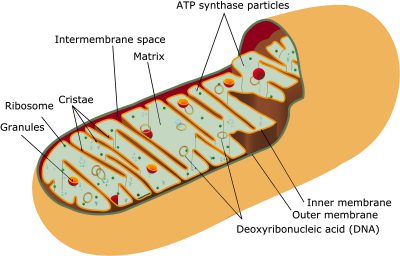 What are mitochondria exactly
What are mitochondria exactly
Here is a diagram of one mitochrondrion and as you can see, there’s a lot going on inside this tiny ‘organelle’. They reside in our cells (except red blood cells) in their hundreds and often thousands . A liver cell, for example, can have upwards of 2000 mitrochondria.
Organelle?
In biological terms, an organelle is a separate structure residing inside a cell which corresponds to an organ residing within our body. The suffix ‘elle’ meaning diminutive.
An immense subject
Now I’m not going to go into the ins and outs of mitochondria because the subject is immense and these tiny organelles have a vast array of roles to play. Some researchers and medical professionals specialise in just mitochondrial function; this area of medical science is a branch of study on its own!
Suffice to say, it is thought by many eminent researchers that the health of the mitochondria is the answer to the majority of our diseases and mitochondrial dysfunction, will be exhibited at the baseline of all conditions.
Energy production
Have a look at this short video. It is actually advertising a good book on Magnesium (Mg) and heart disease, by cardiologist Dr Dennis Goodman MD, but it also explains simply, how Mg is vital to produce ATP (adenosine triphosphate) the energy source of our bodies, which resides within the mighty mitochondria.
Mg-ATP?
It’s important to note that when researchers and scientists talk about ATP they are nearly always referring to the activated version which is when it is magnesium bound as Mg-ATP. For convenience, the Mg has been dropped in most instances, which only serves to hide the role of magnesium in the process of producing energy. This abbreviated notation of ATP may be one of the reasons why the importance of Mg is overlooked in so many instances of disease, particularly with our biggest killer cardiovascular diseases of which Coronary Artery Disease (Ischemic Heart Disease) is the deadliest disease in the world.
Mitochondria’s most important role
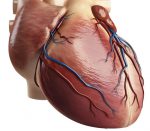 So, one of the main purposes of these organelles is to generate energy for the cell it resides in. Mitochondria converts the energy of glucose and oxygen into Mg-ATP our energy currency which powers the functions of the cell. To run our body’s cells, copious amounts of energy are needed, but not all cells have the same amount of mitochondria. Heart muscle cells are purported to have up to 5,000 mitochrondria within them. You may think our other main muscles like
So, one of the main purposes of these organelles is to generate energy for the cell it resides in. Mitochondria converts the energy of glucose and oxygen into Mg-ATP our energy currency which powers the functions of the cell. To run our body’s cells, copious amounts of energy are needed, but not all cells have the same amount of mitochondria. Heart muscle cells are purported to have up to 5,000 mitochrondria within them. You may think our other main muscles like the biceps would have a similar amount but they have about 200 per cell. Therefore, the number of mitochondria in a cell is proportional to the energy demand of that cell. The heart has to beat continuously over our lifetime without stopping. The biceps are used spasmodically in comparison, hence the lesser amount of mitochondria. Understanding mitochondrial function is critical to the understanding of intracellular health.
the biceps would have a similar amount but they have about 200 per cell. Therefore, the number of mitochondria in a cell is proportional to the energy demand of that cell. The heart has to beat continuously over our lifetime without stopping. The biceps are used spasmodically in comparison, hence the lesser amount of mitochondria. Understanding mitochondrial function is critical to the understanding of intracellular health.
No energy, no life
As you can imagine, without efficient functioning of mitochondria and with a lack of enough energy needed to drive the cell, problems will ensue. Our organs need much energy to be able to function properly. Those organs that need the most are:
- The Brain
- The Heart
- The Lungs
- The Liver
- The Kidneys
- The Muscles
- The Digestive System
Without any one of these organs working properly, our health is seriously compromised. Can you think of any part of our body that does not need some energy to work effectively? Even when we’re asleep, the body is hard at work.
 Ferrari or Reliant Robin!
Ferrari or Reliant Robin!
We are the car and the mitochondria provides the fuel. Without it, we’re not going anywhere fast. Just as a car runs on petrol/diesel, so our bodies run on Mg-ATP. A good supply of healthy mitochondria within our cells is the difference between being a Ferrari or a Reliant Robin! When a car runs out of fuel, it coughs and splutters and slowly comes to a halt, this is an analogy of what happens to the body. When the cells start to deteriorate and die, the body and its organs become starved of energy. Without healthy intervention, the outcome is either a slow decline or a sudden death.
it, we’re not going anywhere fast. Just as a car runs on petrol/diesel, so our bodies run on Mg-ATP. A good supply of healthy mitochondria within our cells is the difference between being a Ferrari or a Reliant Robin! When a car runs out of fuel, it coughs and splutters and slowly comes to a halt, this is an analogy of what happens to the body. When the cells start to deteriorate and die, the body and its organs become starved of energy. Without healthy intervention, the outcome is either a slow decline or a sudden death.
Doctors & mitochondria
Did you know that many of our doctors are not taught about mitochondria during their medical training. This most important tiny structure working at a sub-cellular level is probably not even considered when a doctor tries to diagnose your illness. This to me is incredulous because it is at this level that things start to go wrong in our bodies. This is often the nub of our diseases. Our cells are the building blocks of our body. If they are not healthy, we will suffer a multitude of problems and if mitochondrial dysfunction is not addressed, the body will slowly deteriorate and die before its time.
Isn’t good health common sense?
 So what can we do? What we need to do with our health is to use some common sense! We were born with a certain amount and balance of nutrients, vitamins and minerals. The body was not born with pharmaceutical drugs inside it. Yes, drugs do have their place when all else fails but generally, for most degenerative conditions such as heart disease, autoimmune conditions like parkinson’s and alzheimer’s, illnesses such as diabetes, cancer and stroke, complaints such as ADHD, ADD and OCD, all these diseases start at the cellular level which means it starts with a dysfunction within our cells.
So what can we do? What we need to do with our health is to use some common sense! We were born with a certain amount and balance of nutrients, vitamins and minerals. The body was not born with pharmaceutical drugs inside it. Yes, drugs do have their place when all else fails but generally, for most degenerative conditions such as heart disease, autoimmune conditions like parkinson’s and alzheimer’s, illnesses such as diabetes, cancer and stroke, complaints such as ADHD, ADD and OCD, all these diseases start at the cellular level which means it starts with a dysfunction within our cells.
Junk food and toxins
You’ve heard the saying “rubbish in, rubbish out”, well that applies to our bodies too. Apart from the junk food, excess sugars and sodas we ingest, we are bombarded with toxins and pollutants on a daily basis. We’re breathing in polluted air and eating polluted products.
To fight this onslaught on your body, you have to be proactive. Make sure you and your family keep off the junk food. Try and stop consuming sodas and cut back on sugar intake. Buy as much organic food as you can afford and cook you own meals. At least you will have some idea of what’s in them. If you have a garden, grow your own veggies!
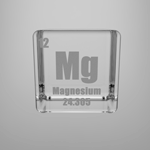 Your 1st line of attack!
Your 1st line of attack!
As for your cellular health and mitochondria, keep them in good fettle by taking in the best supplements and nutrients. Remember that ATP in its active form is Mg-ATP. Mg-ATP cannot be produced without magnesium. So this is your first line of attack. Taking magnesium regularly and keeping yourself replete will make all the difference to your energy levels and all the difference to your general health, including your heart and vascular system.
The heart and Mg
Heart muscle cell mitochondria without Mg will induce heart attack. When a heart attack happens, mitochondria are disrupted and damaged. So what causes this damage?
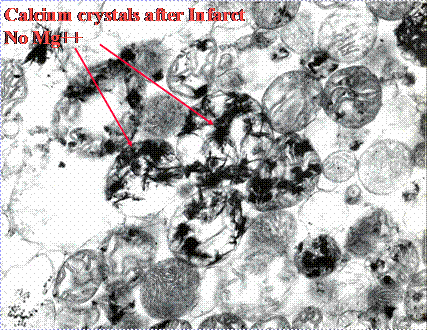 Early research
Early research
Research was done in the 1970s by Dr Burton Silver, Dr Lou Sordahl along with the collaboration of Dr Michael DeBakey’s biochemical group in Houston. Dr Silver took this amazing transmission electron micrograph (TEM) which showed what happens during a heart attack. With no Mg, dense Ca and phosphorus crystals form within the mitochondria. They are like black sharp needles and needless to say, they cause irreversible damage to heart tissue. This is evidence of mitochondrial dysfunction during a heart event.
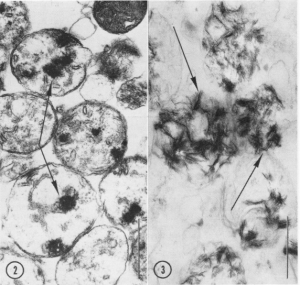 Plant mitochondria
Plant mitochondria
Another study shows a similar micrograph This was a study in plant mitochondria in 1974 and the abstract states: “This study demonstrates that isolated corn shoot mitochondria will accumulate calcium phosphate crystals in vitro that are comparable to those observed in both in vivo and in vitro animal mitochondria.” Those of you who are into gardening have probably come across ‘blossom end rot’ particularly in tomato plants which is caused by an excess of Ca causing cell death in the plant.
And with Magnesium
Even more amazing was the discovery with Dr Silver’s et al research, that an administration or infusion of Mg prior to or during a heart attack, would prevent and protect the heart muscle from forming these destructive crystals. What we now know is that Mg is necessary to control Ca’s entry into and exit out of the cells. If Mg is deficient, it will allow Ca to stay in the cell causing cell death.
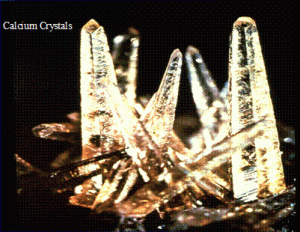 Death by Calcium!
Death by Calcium!
When we die, our cells are flooded with Ca which starts the death throws of our body, heralding the start of rigor mortis. If Ca is allowed to stay in the cell, it will kill it! Of course Ca is vital to us but it is toxic in excess. If there was always enough Mg to control it, that would be great. Our diet just does not have enough Mg to keep Ca in check but the answer is simple. Make sure you are replete with Mg. Don’t take Ca supplements or Ca in forms such as antacids. If your doctor prescribes Ca supplementation, ask why and remind him about balancing with Mg. Be tactful! Medics are not usually knowledgable about Mg. Most of us obtain enough Ca from our food, which is abundant and often fortified in our modern diet.
Be Aware!
Be aware, learn about your health, take your health into your hands. You know how you feel. if you’re feeling unwell, fatigued, depressed, anxious, stressed out, make sure you  know about your condition before you see your medic. You can then work with him to do the best for your problems. Don’t just leave it to him. You can’t expect doctors to know all about every condition and disease and he will more likely prescribe a drug which does not get to the core of your complaint and usually adds another burden to your body. Be proactive and question everything!
know about your condition before you see your medic. You can then work with him to do the best for your problems. Don’t just leave it to him. You can’t expect doctors to know all about every condition and disease and he will more likely prescribe a drug which does not get to the core of your complaint and usually adds another burden to your body. Be proactive and question everything!
Spread the word!

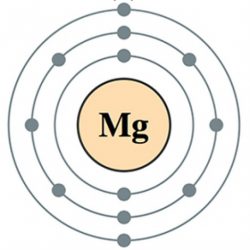
With so much talk about liver function and health, I feel like the mitochondria has been a little forgotten. You’re right, I remember learning about it in high school, but haven’t given it much thought since. Thank you for reminding me. As well, it’s great to know that Mg will help support healthy mitochondria. Thank you for sharing your knowledge. Kristi
Great to hear your comments Kristi. Knowledge is power and we all need to take control of our health and learn about our own bodies. With knowledge we can practice preventative medicine instead of waiting for an illness to strike and then use drugs which control the condition but rarely cures and produces side effects. Ches
I always knew that Mg was important, in fact, all the minerals have an important role to play.
I did not know about MG and Mitochondria, so thanks for that.
The best way to ensure healthy Mg levels is to eat a balanced diet, the problem is that nowadays the soil in many places have been depleted and the nutrients are not there.
Which type of Mg do you recommend? and how well is that particular one absorbed by the body?
There are many mineral supplements out there, but just a few of them are usable by our bodies
Thanks for your comments Manuel. I agree with you totally about the lack of nutrients in our depleted soils. It is a hard task in this modern day, to obtain enough Mg from our food, that’s why a good quality Mg supplement is important for your general overall health and to combat future diseases. Mg Chloride is 100% bio available and has a stability constant of zero which means it is totally ionized, unlike some cheaper supplements like Mg Oxide. Have a look at the reply to the last comment. Ches
I remember learning about this kind of stuff back in biology but I have forgot a bunch, I am really glad I found your site as a little refresher. I love learning and being able to share all my knowledge. I remembered that a mitochondria was like a defender organism but now I am recalling much more. I like how I just learned that mitochondria can be strengthened with magnesium. I have heard a lot of great things about MG. Do you have a preferred brand? I see the one on your side bar but is that the best one I can get?
Thanks for your comments Kenny. The Mg Chloride I recommend is the ionic Mg available in the UK and the US. This is very similar to Dr Dean’s ReMag which is difficult to purchase in the UK but available in the US at $29.99. Mg Chloride is 100% bioavailable and has a stability constant of zero which means it is totally ionized and available to the body, unlike other cheaper Mg salts. Mg citrate which I also recommend for constipation problems suffered by some deficient in Mg, has a 2.8% stability constant which means it is essentially ionized. You can make up your own Mg Chloride but you need to purchase the best quality granules or powder which is of food grade. Most people can’t be bothered to do this but if you’re interested let me know. Ches
Ches Power: I tried Mg Chloride and the pills weren’t coated. Tasted terrible and were not smooth in a capsule but rough and would not slide down my throat. Can you recommend a coated or capsulized brand?
Hi Mary, yes the tablets are often difficult to take, that’s why I only use the liquid Mg Chloride. Dr Dean’s ReMag is a good brand but as with all Mg Chloride supplements, the taste isn’t great. But with the liquid you can at least mask the taste with a cordial such as Roses lime juice or one we’ve just tried Elderflower cordial (not sugar free because of artificial sweeteners). If you have a tendency towards constipation as some Mg deficients do, the Mg Citrate powder is a good alternative. You can also regulate your dose to suit your body. Take Mg citrate in small doses at first until your digestion is good. Hope that helps.